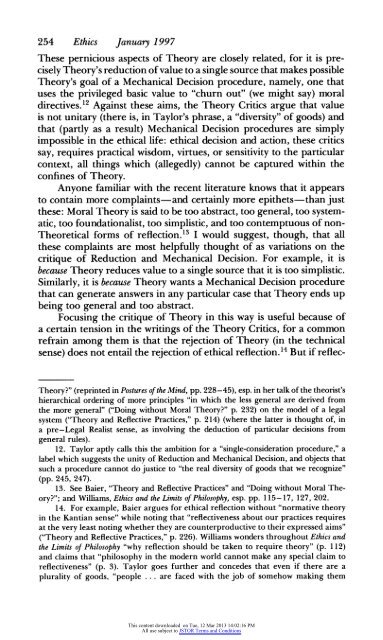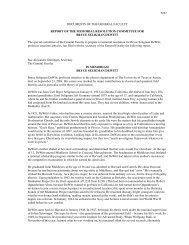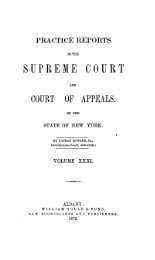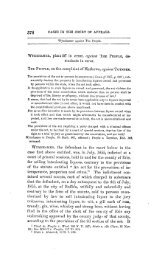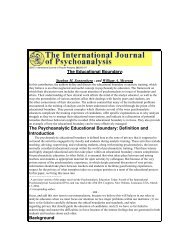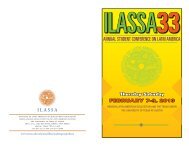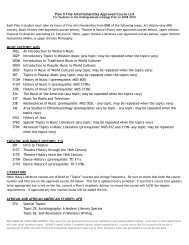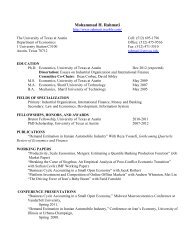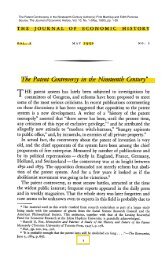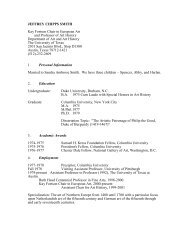Nietzsche and the Morality Critics - The University of Texas at Austin
Nietzsche and the Morality Critics - The University of Texas at Austin
Nietzsche and the Morality Critics - The University of Texas at Austin
You also want an ePaper? Increase the reach of your titles
YUMPU automatically turns print PDFs into web optimized ePapers that Google loves.
254 Ethics January 1997<strong>The</strong>se pernicious aspects <strong>of</strong> <strong>The</strong>ory are closely rel<strong>at</strong>ed, for it is precisely<strong>The</strong>ory's reduction <strong>of</strong> value to a single source th<strong>at</strong> makes possible<strong>The</strong>ory's goal <strong>of</strong> a Mechanical Decision procedure, namely, one th<strong>at</strong>uses <strong>the</strong> privileged basic value to "churn out" (we might say) moraldirectives.'2 Against <strong>the</strong>se aims, <strong>the</strong> <strong>The</strong>ory <strong>Critics</strong> argue th<strong>at</strong> valueis not unitary (<strong>the</strong>re is, in Taylor's phrase, a "diversity" <strong>of</strong> goods) <strong>and</strong>th<strong>at</strong> (partly as a result) Mechanical Decision procedures are simplyimpossible in <strong>the</strong> ethical life: ethical decision <strong>and</strong> action, <strong>the</strong>se criticssay, requires practical wisdom, virtues, or sensitivity to <strong>the</strong> particularcontext, all things which (allegedly) cannot be captured within <strong>the</strong>confines <strong>of</strong> <strong>The</strong>ory.Anyone familiar with <strong>the</strong> recent liter<strong>at</strong>ure knows th<strong>at</strong> it appearsto contain more complaints-<strong>and</strong> certainly more epi<strong>the</strong>ts-than just<strong>the</strong>se: Moral <strong>The</strong>ory is said to be too abstract, too general, too system<strong>at</strong>ic,too found<strong>at</strong>ionalist, too simplistic, <strong>and</strong> too contemptuous <strong>of</strong> non-<strong>The</strong>oretical forms <strong>of</strong> reflection.13 I would suggest, though, th<strong>at</strong> all<strong>the</strong>se complaints are most helpfully thought <strong>of</strong> as vari<strong>at</strong>ions on <strong>the</strong>critique <strong>of</strong> Reduction <strong>and</strong> Mechanical Decision. For example, it isbecause <strong>The</strong>ory reduces value to a single source th<strong>at</strong> it is too simplistic.Similarly, it is because <strong>The</strong>ory wants a Mechanical Decision procedureth<strong>at</strong> can gener<strong>at</strong>e answers in any particular case th<strong>at</strong> <strong>The</strong>ory ends upbeing too general <strong>and</strong> too abstract.Focusing <strong>the</strong> critique <strong>of</strong> <strong>The</strong>ory in this way is useful because <strong>of</strong>a certain tension in <strong>the</strong> writings <strong>of</strong> <strong>the</strong> <strong>The</strong>ory <strong>Critics</strong>, for a commonrefrain among <strong>the</strong>m is th<strong>at</strong> <strong>the</strong> rejection <strong>of</strong> <strong>The</strong>ory (in <strong>the</strong> technicalsense) does not entail <strong>the</strong> rejection <strong>of</strong> ethical reflection.'4 But if reflec-<strong>The</strong>ory?" (reprinted in Postures <strong>of</strong> <strong>the</strong> Mind, pp. 228-45), esp. in her talk <strong>of</strong> <strong>the</strong> <strong>the</strong>orist'shierarchical ordering <strong>of</strong> more principles "in which <strong>the</strong> less general are derived from<strong>the</strong> more general" ("Doing without Moral <strong>The</strong>ory?" p. 232) on <strong>the</strong> model <strong>of</strong> a legalsystem ("<strong>The</strong>ory <strong>and</strong> Reflective Practices," p. 214) (where <strong>the</strong> l<strong>at</strong>ter is thought <strong>of</strong>, ina pre-Legal Realist sense, as involving <strong>the</strong> deduction <strong>of</strong> particular decisions fromgeneral rules).12. Taylor aptly calls this <strong>the</strong> ambition for a "single-consider<strong>at</strong>ion procedure," alabel which suggests <strong>the</strong> unity <strong>of</strong> Reduction <strong>and</strong> Mechanical Decision, <strong>and</strong> objects th<strong>at</strong>such a procedure cannot do justice to "<strong>the</strong> real diversity <strong>of</strong> goods th<strong>at</strong> we recognize"(pp. 245, 247).13. See Baier, "<strong>The</strong>ory <strong>and</strong> Reflective Practices" <strong>and</strong> "Doing without Moral <strong>The</strong>ory?";<strong>and</strong> Williams, Ethics <strong>and</strong> <strong>the</strong> Limits <strong>of</strong> Philosophy, esp. pp. 115-17, 127, 202.14. For example, Baier argues for ethical reflection without "norm<strong>at</strong>ive <strong>the</strong>oryin <strong>the</strong> Kantian sense" while noting th<strong>at</strong> "reflectiveness about our practices requires<strong>at</strong> <strong>the</strong> very least noting whe<strong>the</strong>r <strong>the</strong>y are counterproductive to <strong>the</strong>ir expressed aims"("<strong>The</strong>ory <strong>and</strong> Reflective Practices," p. 226). Williams wonders throughout Ethics <strong>and</strong><strong>the</strong> Limits <strong>of</strong> Philosophy "why reflection should be taken to require <strong>the</strong>ory" (p. 112)<strong>and</strong> claims th<strong>at</strong> "philosophy in <strong>the</strong> modern world cannot make any special claim toreflectiveness" (p. 3). Taylor goes fur<strong>the</strong>r <strong>and</strong> concedes th<strong>at</strong> even if <strong>the</strong>re are aplurality <strong>of</strong> goods, "people ... are faced with <strong>the</strong> job <strong>of</strong> somehow making <strong>the</strong>mThis content downloaded on Tue, 12 Mar 2013 14:02:16 PMAll use subject to JSTOR Terms <strong>and</strong> Conditions


